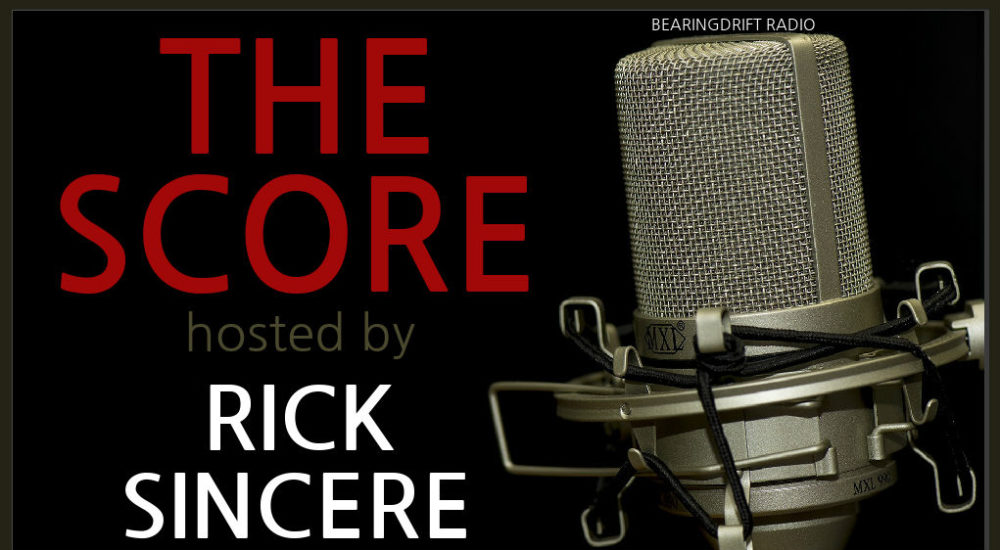The Score: Frederick Douglass, Embassy Bombings, Campus Speech, Electoral College
This week on The Score: Why was Frederick Douglass the most photographed American during the nineteenth century? What is the status of free speech on our college campuses? How significant were the 1998 U.S. Embassy bombings in Kenya and Tanzania? Is the Electoral College relevant or a relic?
During the first half of today’s show, we return to the Virginia Festival of the Book in Charlottesville, where I met a distinguished historian and a veteran diplomat. Also, I connected with Reason magazine writer Robby Soave at the U.S. Navy Memorial in Washington. Later, Tim Hulsey reviews a new movie about libraries and I talk to John Samples about the Electoral College.
Frederick Douglass
 Those of you who have listened to The Score here on the Bearing Drift web site rather than on the radio may already have heard a snippet from my interview with historian David W. Blight, who has written a lengthy biography of Frederick Douglass, a former slave who became one of the leaders in the movement to abolish slavery, a newspaper publisher, famous orator, and an ambassador for President Benjamin Harrison.
Those of you who have listened to The Score here on the Bearing Drift web site rather than on the radio may already have heard a snippet from my interview with historian David W. Blight, who has written a lengthy biography of Frederick Douglass, a former slave who became one of the leaders in the movement to abolish slavery, a newspaper publisher, famous orator, and an ambassador for President Benjamin Harrison.
David Blight spoke at the Virginia Festival of the Book about Frederick Douglass: Prophet of Freedom and, after a panel discussion that also featured Raymond Arsenault talking about his biography of Arthur Ashe, I took him aside to ask him a few questions about Frederick Douglass. I wondered if Douglass deserves to be a libertarian icon, why he broke with leaders of the women’s rights movement, and how he performed as a diplomat in Haiti.
David W. Blight has a Twitter profile at @DavidWBlight but he has not yet sent a tweet to his 1,288 followers.
Diplomacy and Terrorism
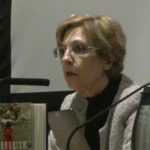 Another author at the Virginia Festival of the Book was Ambassador Prudence Bushnell, a veteran of the U.S. Foreign Service. She was serving as the U.S. Ambassador to Kenya in August 1998, when al-Qaeda terrorists bombed the American Embassy in Nairobi. A simultaneous blast exploded at the U.S. Embassy in Tanzania. Hundreds were killed and injured.
Another author at the Virginia Festival of the Book was Ambassador Prudence Bushnell, a veteran of the U.S. Foreign Service. She was serving as the U.S. Ambassador to Kenya in August 1998, when al-Qaeda terrorists bombed the American Embassy in Nairobi. A simultaneous blast exploded at the U.S. Embassy in Tanzania. Hundreds were killed and injured.
It took Ambassador Bushnell almost twenty years to write a book about her experiences, Terrorism, Betrayal, and Resilience: My Story of the 1998 U.S. Embassy Bombings (2018), which also offers her advice on counterterrorism policy and U.S. foreign policy in general. She is not keen on a foreign policy that relies more on military might than it does on diplomacy and other kinds of “soft power” engagement.
Bushnell told me:
The bombings of the embassies in Kenya and Tanzania were the worst bombings in diplomatic history, and also it was a strike from Al Qaeda. That gave us a warning sign, and nobody listened and soon, we were forgotten, I kept waiting for someone else to write the book, no one did….
My warnings were not treated [seriously, I believe, and I’ve had intelligence people come and tell me that I’m right, that all of the information was there. But the fussing and the feuding and the secrecy and the turf battles among our intelligence agencies was such that the information I had was irrelevant. That, I think, has changed dramatically since 9/11. We are now sharing intelligence worldwide, certainly in this country, hopefully not only horizontally but also vertically. I am thrilled we have not had a terrorist event from outsiders since then, which is not to say we have not had domestic terrorist events.
Follow Bushnell on Twitter at @Pru_Bushnell.
Free Speech on Campus
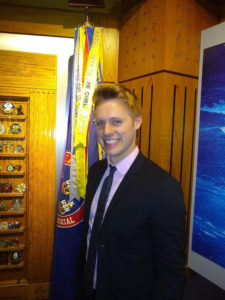 A funny thing happened on my way to the forum on campus free speech hosted by the McCain Institute in Washington. Upon our arrival, audience members were told the event had been postponed because of a power outage in the U.S. Navy Memorial building, where the debate was to take place. That didn’t prevent us from chatting over drinks and finger food in a darkened reception room with McCain Institute staff and the postponed debaters.
A funny thing happened on my way to the forum on campus free speech hosted by the McCain Institute in Washington. Upon our arrival, audience members were told the event had been postponed because of a power outage in the U.S. Navy Memorial building, where the debate was to take place. That didn’t prevent us from chatting over drinks and finger food in a darkened reception room with McCain Institute staff and the postponed debaters.
It seems like every day we see a new headline about some college where speakers were shouted off stage or a professor came under fire for using inconsiderate words in the classroom. Reason magazine writer Robby Soave has been following these stories for years, and he is soon to publish a book with his reporting and analysis called Panic Attack: Young Radicals in the Age of Trump (due out in June). He was one of the scheduled speakers and I spoke to him in lieu of the debate.
He shared this item with me:
I hear from professors all the time — again left-of- center — who are afraid of their new students. [afraid] that the students are going to file a report with the administrative bureaucracy against them and they’re going to get in trouble for saying something that would have been uncontroversial in the 1970s or ’80s relating to race or gender or whatever, but now is not something you can say among the new activists….
There’s a story in my book of a theater professor — again, a left-of-center professor — who teaches at a very elite college [and] who found she could not give any advice to her students (these were acting students in an acting class) because everything she told them, they claimed, had triggered their post traumatic stress. She said, you know, “read this passage differently, act it differently,” [and they] all said, “No, I can’t. Just you saying to this to me has caused me irreparable emotional harm.” Her frustration that just trying to teach her profession … was kind of funny and very telling.
Robby Soave is on Twitter as @RobbySoave.
The Score previously reported on the topic of speech on college campuses in an interview with Princeton Professor Keith Whittington in the episode dated April 14, 2018.
‘The Public’
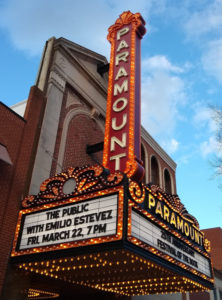 During the Virginia Festival of the Book, earlier this month, actor Emilio Estevez – son of Martin Sheen, brother of Charlie Sheen – brought his new film, The Public, to Charlottesville for a screening that was also hosted by the Virginia Film Festival. The Public is set in a public library – that’s the connection to books – and raises questions about how our society treats the homeless and the mentally ill, as well as how they treat librarians. After the screening, Estevez answered questions about the movie posed by Washington Post film critic Ann Hornaday.
During the Virginia Festival of the Book, earlier this month, actor Emilio Estevez – son of Martin Sheen, brother of Charlie Sheen – brought his new film, The Public, to Charlottesville for a screening that was also hosted by the Virginia Film Festival. The Public is set in a public library – that’s the connection to books – and raises questions about how our society treats the homeless and the mentally ill, as well as how they treat librarians. After the screening, Estevez answered questions about the movie posed by Washington Post film critic Ann Hornaday.
The Public opens widely in cinemas across the country beginning April 5. The film, which was made over 22 days at the Cincinnati-Hamilton County Library in Ohio, also has an all-star cast that features Alec Baldwin, Jena Malone, Taylor Schilling, Christian Slater, Michael Kenneth Williams, Gabrielle Union, and Jeffrey Wright.
The Score’s own film critic, Tim Hulsey, has some sharp things to say about The Public and its screenwriter and director, Emilio Estevez. Here’s a sample:
Any conservative unlucky enough or masochistic enough to venture into The Public will immediately notice that its right-wing characters are all left-wing caricatures. Christian Slater, from the television series Mr. Robot, plays a heartless district attorney with a suit, a smirk and a scowl. Alec Baldwin, lately of Saturday Night Live and inexplicably top-billed in the minor role of a police negotiator, gives a performance so dead on its feet that I half-wished he would break into a Donald Trump impersonation With Emilio Estevez, Alec Baldwin, and Christian Slater in the same film. though never quite in the same room, The Public often feels more like an “I Love the 80s” reunion than a heartfelt plea for social justice.
The one thing that it gets right is its depiction of librarians, who are shown here not as all knowing gatekeepers of civilization, or as grey-faced gargoyles with fingers perpetually on their lips, but as intelligent professionals with fun, vibrant personalities, a strong code of ethics, and a real desire to help their patrons.
The Public is on Twitter as @ThePublicFilm.
Electoral College
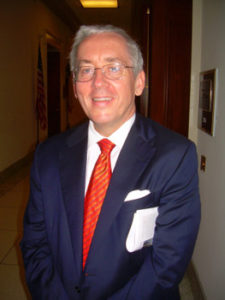 Lately we have been hearing a lot from Democratic presidential candidates and others about the Electoral College. They remind us that their party’s candidate, Hillary Clinton, won about three million more votes in 2016 than Donald Trump did, yet because of the way our system of electing presidents works, Trump became commander in chief and Clinton became a retired politician.
Lately we have been hearing a lot from Democratic presidential candidates and others about the Electoral College. They remind us that their party’s candidate, Hillary Clinton, won about three million more votes in 2016 than Donald Trump did, yet because of the way our system of electing presidents works, Trump became commander in chief and Clinton became a retired politician.
I spoke by telephone on Wednesday with John Samples, vice president of the Cato Institute in Washington, about proposals to change or eliminate the Electoral College. We talked about the unintended consequences that could result if those proposals become law.
John Samples, too, has not tweeted but he has a Twitter profile at @SamplesAtCato.
From the Archives
Reaching back into the archives, I found an interview from the 2014 Virginia Festival of the Book with author Stephen Jimenez, who wrote a controversial book called The Book of Matt: Hidden Truths About the Murder of Matthew Shepard, in which he investigates the murder of Matthew Shepard, a young gay man whose death raised strong demands for state and federal hate-crime laws. Jimenez concludes that the murder was not so much a hate crime as a drug crime. (See his book festival remarks on this video.)
Next week on The Score, we’ll have one more interview to close out the 2019 Virginia Festival of the Book. That one will feature New York Times Washington editor Jonathan Weisman, talking about his recent book on modern-day anti-Semitism.
